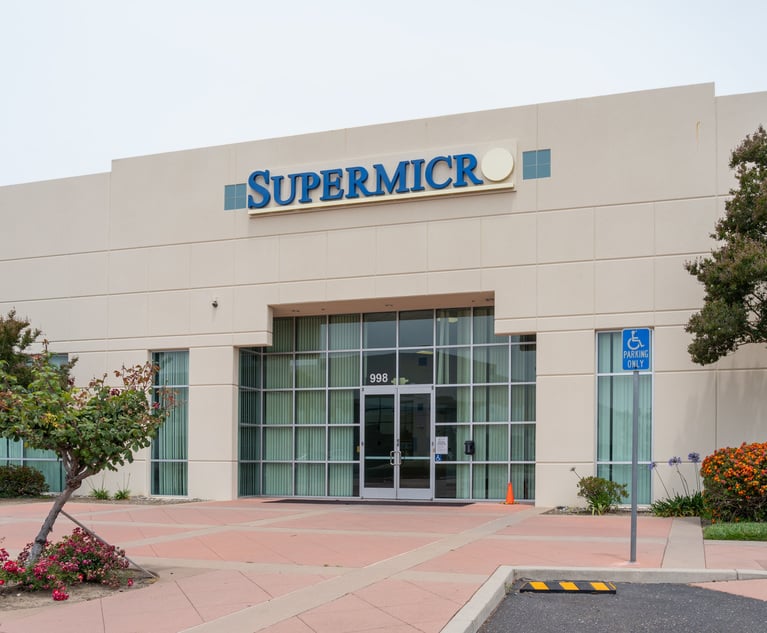COVID-19's Impact on Tech Startups
Tech startups are now facing the sorts of challenges that can lead to litigation, and litigation is rarely a desirable avenue, especially now.
May 22, 2020 at 05:07 PM
5 minute read
 Dr. Ryan Abbott, JAMS Mediator and Arbitrator. Photo: Courtesy Photo.
Dr. Ryan Abbott, JAMS Mediator and Arbitrator. Photo: Courtesy Photo.
The COVID-19 pandemic has caused unprecedented business interruption across nearly all industries, with tech startups facing some of the greatest challenges. Venture capital funding has quickly become more selective, which can hurt companies dependent on a steady infusion of capital. Some startups are seeing dramatic revenue reductions because existing customers are either unable or unwilling to pay on time. Revenue is falling short of pre-COVID-19 financial projections because prospective customers are tightening their belts. Supply chain disruptions have left a few startups unable to manufacture or sell their goods, and even though employees are largely working remotely, commercial landlords have taken firm positions with respect to rent. To top it off, insurers have been unreceptive to force majeure claims.
It has not all been bad. On the positive side, tech startups are relatively well situated to adapt to remote working arrangements. Also, the interruption has directly benefited companies offering online services, cloud infrastructure and automation technologies. COVID-19 may increase demand for cutting-edge and disruptive services. In the meantime, a number of tech startups have pivoted to create offerings related to COVID-19, such as diagnostic and therapeutic tools and solutions.
However, tech startups are now facing the sorts of challenges that can lead to litigation, and litigation is rarely a desirable avenue, especially now. For example, a dispute over withdrawn financing or a withheld payment might take years to resolve—which means a favorable judgment may ultimately come too late for a startup that needs cash now. Litigation can take years in the best of times, and COVID-19 has effectively halted the wheels of justice. Courts have scaled back their functions, so trials and hearings across the country have been continued or suspended. For startups seeking efficiency, spending money on litigation when the courts are closed is a questionable proposition.
Alternative dispute resolution (ADR) is an attractive option for startups. Whereas conventional litigation can be very time-consuming, an expedited arbitration should result in a final award within six months. And while courts have largely shut down, arbitrations are being conducted online. Just as tech startups offering online services have experienced a surge in interest, so too has online dispute resolution.
ADR may even be able to prevent a conflict from progressing to litigation. When the potential for conflict arises—attempted renegotiation of deal terms, manufacturing failures, partnership disputes—neutral third parties can help to resolve these matters with pre-dispute mediations or structured negotiations. Litigation tends to create barriers to settling and forces parties to become entrenched in their positions, while early mediation can allow parties to save face and to adopt flexible and business-oriented solutions. A neutral may even be assigned to a particular project or partnership before a problem develops. Implementing a conflict management process can contain and deescalate friction before it derails critical initiatives. Even at a more contentious stage, ADR can help to stave off litigation through early case assessment or neutral evaluation of a dispute.
Consider a recent scenario involving a tech startup experiencing a cash flow crisis that resulted from its venture capital (VC) partner declining to provide additional funding despite recently executing a second-round term sheet. The startup and VC partner went to mediation after their negotiations reached an impasse and litigation was threatened. Shortly thereafter, the VC partner provided less funding than initially agreed, but enough to allow the startup to continue operations for several more months. This helped the VC partner avoid negative publicity and protect its earlier investment in the startup, and it allowed the startup to seek alternate means of financing and to restructure in a way that reduced its burn rate.
The startup was able to further lessen its short-term financial obligations through a mediator-led structured negotiation with its primary contract manufacturer. In a creative resolution, the startup satisfied its outstanding liability to the manufacturer through a combination of its own services and a longer-term contract that deferred payments.
No court could have ordered such outcomes, and conventional negotiation, which is inherently competitive in nature, seldom prioritizes finding common ground. Amid the political and economic turmoil arising from COVID-19, attitudes toward technology and the environment are changing. In uncertain times, long-term plans must be shaped by short-term exigencies. A favorable judgment a few years from now is worth nothing if the debtor cannot pay, and while capital is tied up in value-destructive litigation, technology and competition continue to advance. Disputes are a drain on a company's resources. Few can afford the distraction when events, attitudes and markets are shifting this rapidly.
Ryan Abbott is a neutral at JAMS in Los Angeles and London. He has domestic and international experience in the fields of intellectual property, technology and health care. He is the author of the book, "The Reasonable Robot: Artificial Intelligence and the Law," which will publish through the University of Surrey School of Law in June 2020.
This content has been archived. It is available through our partners, LexisNexis® and Bloomberg Law.
To view this content, please continue to their sites.
Not a Lexis Subscriber?
Subscribe Now
Not a Bloomberg Law Subscriber?
Subscribe Now
NOT FOR REPRINT
© 2025 ALM Global, LLC, All Rights Reserved. Request academic re-use from www.copyright.com. All other uses, submit a request to [email protected]. For more information visit Asset & Logo Licensing.
You Might Like
View All

'A Warning Shot to Board Rooms': DOJ Decision to Fight $14B Tech Merger May Be Bad Omen for Industry

California Walnut Grower and German Investment Firm Vie for Lead Plaintiff Status in Super Micro Securities Action

Apple Files Appeal to DC Circuit Aiming to Intervene in Google Search Monopoly Case
3 minute readTrending Stories
- 1Uber Files RICO Suit Against Plaintiff-Side Firms Alleging Fraudulent Injury Claims
- 2The Law Firm Disrupted: Scrutinizing the Elephant More Than the Mouse
- 3Inherent Diminished Value Damages Unavailable to 3rd-Party Claimants, Court Says
- 4Pa. Defense Firm Sued by Client Over Ex-Eagles Player's $43.5M Med Mal Win
- 5Losses Mount at Morris Manning, but Departing Ex-Chair Stays Bullish About His Old Firm's Future
Who Got The Work
J. Brugh Lower of Gibbons has entered an appearance for industrial equipment supplier Devco Corporation in a pending trademark infringement lawsuit. The suit, accusing the defendant of selling knock-off Graco products, was filed Dec. 18 in New Jersey District Court by Rivkin Radler on behalf of Graco Inc. and Graco Minnesota. The case, assigned to U.S. District Judge Zahid N. Quraishi, is 3:24-cv-11294, Graco Inc. et al v. Devco Corporation.
Who Got The Work
Rebecca Maller-Stein and Kent A. Yalowitz of Arnold & Porter Kaye Scholer have entered their appearances for Hanaco Venture Capital and its executives, Lior Prosor and David Frankel, in a pending securities lawsuit. The action, filed on Dec. 24 in New York Southern District Court by Zell, Aron & Co. on behalf of Goldeneye Advisors, accuses the defendants of negligently and fraudulently managing the plaintiff's $1 million investment. The case, assigned to U.S. District Judge Vernon S. Broderick, is 1:24-cv-09918, Goldeneye Advisors, LLC v. Hanaco Venture Capital, Ltd. et al.
Who Got The Work
Attorneys from A&O Shearman has stepped in as defense counsel for Toronto-Dominion Bank and other defendants in a pending securities class action. The suit, filed Dec. 11 in New York Southern District Court by Bleichmar Fonti & Auld, accuses the defendants of concealing the bank's 'pervasive' deficiencies in regards to its compliance with the Bank Secrecy Act and the quality of its anti-money laundering controls. The case, assigned to U.S. District Judge Arun Subramanian, is 1:24-cv-09445, Gonzalez v. The Toronto-Dominion Bank et al.
Who Got The Work
Crown Castle International, a Pennsylvania company providing shared communications infrastructure, has turned to Luke D. Wolf of Gordon Rees Scully Mansukhani to fend off a pending breach-of-contract lawsuit. The court action, filed Nov. 25 in Michigan Eastern District Court by Hooper Hathaway PC on behalf of The Town Residences LLC, accuses Crown Castle of failing to transfer approximately $30,000 in utility payments from T-Mobile in breach of a roof-top lease and assignment agreement. The case, assigned to U.S. District Judge Susan K. Declercq, is 2:24-cv-13131, The Town Residences LLC v. T-Mobile US, Inc. et al.
Who Got The Work
Wilfred P. Coronato and Daniel M. Schwartz of McCarter & English have stepped in as defense counsel to Electrolux Home Products Inc. in a pending product liability lawsuit. The court action, filed Nov. 26 in New York Eastern District Court by Poulos Lopiccolo PC and Nagel Rice LLP on behalf of David Stern, alleges that the defendant's refrigerators’ drawers and shelving repeatedly break and fall apart within months after purchase. The case, assigned to U.S. District Judge Joan M. Azrack, is 2:24-cv-08204, Stern v. Electrolux Home Products, Inc.
Featured Firms
Law Offices of Gary Martin Hays & Associates, P.C.
(470) 294-1674
Law Offices of Mark E. Salomone
(857) 444-6468
Smith & Hassler
(713) 739-1250






